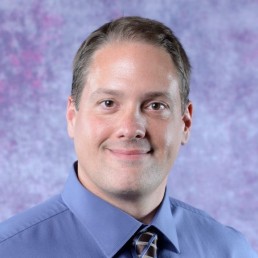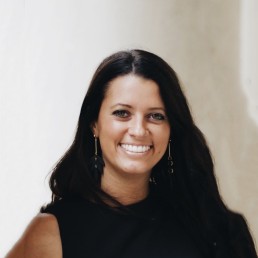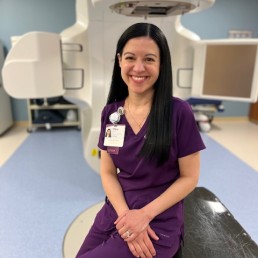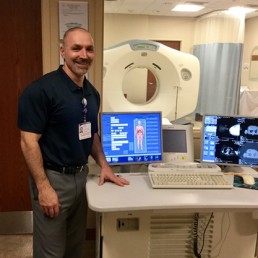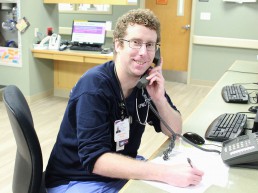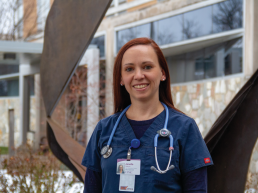You’d be hard-pressed to walk down the street without meeting someone who has been affected by cancer, whether through their own experience or that of a loved one. While cancer remains a devastating disease that affects nearly 2 million people every year in the United States alone, treatment is more advanced than ever. Our health care teams know more about cancer than ever before and can deploy effective treatments that give patients the best possible chance of fighting and beating their cancer diagnosis.
One of these care teams that a cancer patient may encounter is Radiation Therapy. The skilled members of our Radiation Therapy team use beams of intense energy, often X-rays, to kill cancer cells. Their roles require a keen grasp of technology, innovative thinking, and above all, a heart of empathy for patients. At UPMC Hillman Cancer Center, and across our organization, our radiation therapists bring all of those qualities and more to their work every day, and four of them shared with us about what their careers in Radiation Therapy mean to them.
What steps led you into a career in Radiation Therapy?
I was a seventeen-year-old in high school who was unsure about my future profession. At the time, my brother-in-law was employed in radiology, and he influenced my decision to apply to a program. As a part of my training, I had to spend a week shadowing in various disciplines, such as CT, MRI, ultrasound, and radiation oncology. I knew immediately that I wanted to continue my education in the field of radiation oncology. The fact that every member of the staff knew each patient by name amazed me. Because you treat your patients every day, you truly get to know them. It is very satisfying knowing I am helping these people to battle this serious disease of cancer. – Pietro P.
Radiation therapy was a career change for me. I was a social worker for eight years, but when my mother was diagnosed with stage 4 colon cancer, my life took a completely different trajectory. After losing my mom, I knew with absolute certainty that I wanted to work with cancer patients. I went back to school in my early 30’s to become a radiation therapist and I ended up finding the career that I truly believe I was always meant to be in. – Tiffany S.
In the late ‘90s, I was working in the steel industry. When things started to look bleak in that industry, I turned my eye towards the medical field. I entered X-ray school, where I was able to shadow many potential career paths. I was drawn to radiation therapy and decided to enter the program at CCAC immediately upon graduating X-ray school. My first job as a radiation therapist was at UPMC Shadyside. After a few years, I decided to apply to the dosimetry training program offered by UPMC, and I realized my goal of becoming a certified medical dosimetrist. – Mitchell B.
"I am grateful for the opportunity to be part of a team that can have a positive impact on the lives of the patients we serve here at UPMC."
— Mitchell B., Chief Medical Dosimetrist
What do you enjoy most about your current role?
When my mom was undergoing treatment, we encountered professionals who treated her like a person rather than a disease, people who exhibited a level of empathy and care that made a tangible difference in her quality of life. My driving force for choosing this career was to be that lifeline for someone else, to be that difference-making influence on my patients’ lives. As a radiation therapist, I have an active, hands-on role in delivering my patients’ treatments. There is nothing more fulfilling than seeing a patient come back for follow-up years later and having them tell me that they are cancer-free. I do not take for granted the privilege that I have in being a part of my patients’ journeys. – Tiffany S.
I enjoy the learning opportunities to grow within this role not only professionally but personally. I enjoy being a part of a large organization where there are other quality members and leaders to share education and knowledge with others. – Emily B.
Technology is ever-changing, and so is the field of radiation oncology. We must constantly adapt, focusing our efforts on the issues at hand, as we work with our teams to deliver high quality radiation treatments for our patients. I am grateful for the opportunity to be part of a team that can have a positive impact on the lives of the patients we serve here at UPMC. – Mitchell B.
"In the wider scope of health care, radiation oncology is a relatively small field; the advantage of this is that you have the ability to develop friendships that will sustain you throughout your entire career."
— Tiffany S., Clinical Radiation Therapist
With many options for employment in health care, why did you choose UPMC?
UPMC has a strong reputation within the community and offers many locations for employment. This was a huge win when I was working in a clinical role and has brought lots of growth opportunity as a quality member. From the beginning there has been great mentorship, support, and recognition. – Emily B.
UPMC provides career ladders and tuition reimbursement to its employees, and I decided to take advantage of these opportunities and enrolled in programs to advance my education. I also took advantage of the opportunity to progress my career through the career ladders and was able to move up to the position of lead therapist, which finally led to my current position as Chief Radiation Therapist. These opportunities are why I’ve worked at UPMC for the past 26 years. – Pietro P.
I chose to work for UPMC because of the quality of care that I witnessed during my clinical rotations and because of the exceptional radiation therapists who helped to teach me and who I am now lucky enough to call colleagues and friends. In the wider scope of health care, radiation oncology is a relatively small field; the advantage of this is that you have the ability to develop relationships and friendships that will sustain you throughout your entire career. As an experienced therapist, I now have the opportunity to mentor students the way that I was mentored, and that has been a particularly fulfilling part of my career. – Tiffany S.


